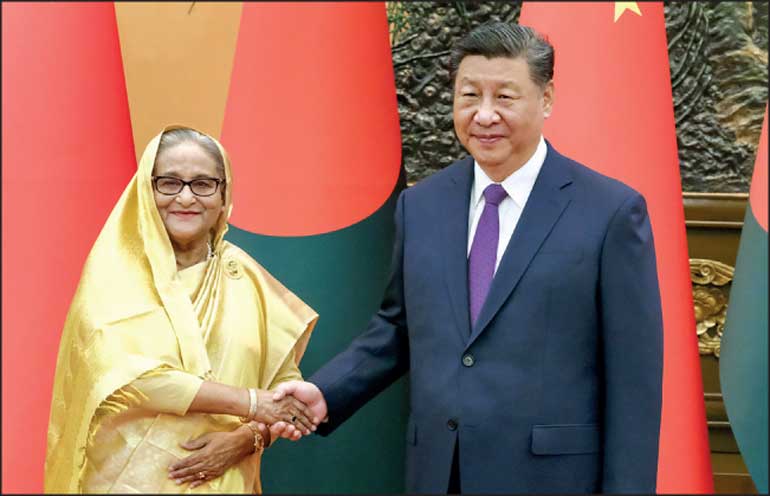Tuesday Feb 17, 2026
Tuesday Feb 17, 2026
Saturday, 13 July 2024 00:03 - - {{hitsCtrl.values.hits}}

Bangladeshi Prime Minister Sheikh Hasina and Chinese President Xi Jinping
China and Bangladesh this week elevated their relations to a comprehensive strategic cooperative partnership. Chinese President Xi Jinping and Bangladeshi Prime Minister Sheikh Hasina announced this while meeting in Beijing.
Experts described Hasina’s visit to China as a journey of cooperation and friendship. Although some Indian media outlets are seemingly concerned about the visit, experts said the development of China-Bangladesh ties does not target any third party, and will be conducive to overall peace and stability in South Asia.
During the meeting, Xi told Hasina that China and Bangladesh are good neighbours who know each other well and have had friendly exchanges for thousands of years. Since the establishment of diplomatic relations, the two countries have always respected and supported each other, treated each other as equals, and cooperated for win-win results, setting an example of friendly exchanges and mutually beneficial cooperation between countries, especially between the “Global South.”
China cherishes the profound friendship established by the older generation of leaders of China and Bangladesh, and is willing to take the 50th anniversary of the establishment of diplomatic relations next year as an opportunity to deepen the high-quality joint construction of the Belt and Road Initiative (BRI) and expand the depth and breadth of cooperation in various fields, Xi said.
Xi stressed that China supports Bangladesh in adhering to an independent foreign policy, following a development path that suits its national conditions, safeguarding national sovereignty, independence, and territorial integrity, and opposing any external interference.
Hasina said that Bangladesh firmly adheres to the one-China principle, supports China’s stance on the Taiwan question, resolutely opposes external forces’ interference in China’s internal affairs, and firmly supports China in safeguarding its core interests.
The Chinese Premier Li Qiang also met with Hasina. According to the Bangladesh Sangbad Sangstha (BSS), the country’s national news agency, the two countries have signed 21 instruments including two renewed MoUs and announced seven more projects.
Talks between Li and Hasina mainly concerned trade and investment, as well as bilateral relations alongside various regional and international matters, according to BSS. The instruments on cooperation in the economic and banking sector, trade and investment, digital economy, infrastructure development, assistance in disaster management, construction of the 6th and 9th Bangladesh-China friendship bridges, export of agricultural products from Bangladesh, and people to people connectivity were signed.
While in Beijing, Hasina attended the “Bangladesh-China Business, Trade and Investment Summit” and delivered a keynote speech.
Hasina said she “encouraged the Chinese business community to consider key sectors in Bangladesh, such as energy, renewable energy, and logistic centres,” adding that Bangladesh is also “keen to export more products to China, such as textiles, garments, leather and leather goods, and other products,” according to CGTN.
At the event, industry giants Huawei and China National Chemical Engineering Group Corporation signed a Memorandum of Cooperation with delegates from Bangladesh.
In the latest trade data released by China’s General Administration of Customs, from January to May, China-Bangladesh bilateral trade amounted to 74.91 billion yuan ($ 10.3 billion), gaining a positive growth of 0.2% Year-on-Year. China remains Bangladesh’s largest trading partner.
Moreover, China has also been one of the largest sources of investment in the South Asian country. As of the end of 2023, China’s investment stock in Bangladesh had increased to nearly $ 1.4 billion, and there were nearly 700 Chinese-funded companies in Bangladesh, creating more than 550,000 jobs, according to the Chinese Embassy in Bangladesh.
(Source: https://www.globaltimes.cn/page/202407/1315808.shtml)